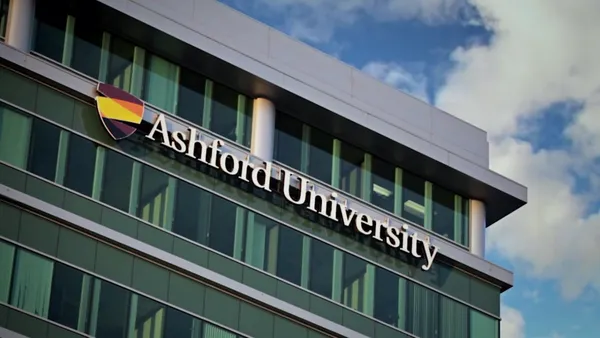Peek into boardrooms across higher ed and you'll notice conservation concerns are steadily building. So much so that organizations like the Association for the Advancement of Sustainability in Higher Education (AASHE) have invested considerable resources in steering green practices in campuses across the U.S. In 2020, more than 1,000 colleges and universities registered to use AASHE's reporting tool to benchmark their sustainability efforts.
Still, sustainability has limited traction. In a recent survey by Higher Ed Dive and FedEx Office, only 22% of surveyed higher ed professionals indicated that their organization had made meaningful progress in this area.
McKinsey: To make progress, zoom into specific sustainability topics
Where to start? McKinsey researchers recommend that leaders focus on specific sustainability topics, versus a broad, all-encompassing view. "Sustainability is often used as a catch-all term covering a great many topics. But for any given company, few topics will be of equal importance," they explained. To do this well, leaders should define a list of sustainability topics that matter most to the organization, either because it's important to the institution or because there are areas in which the organization is well-positioned to make a difference.
For some colleges and universities, that exercise involves reassessing their use of paper, print, mail and parcel management operations. Heather Strange and Joe Polizzi, both regional account managers with FedEx Office, often help institutions advance sustainable practices in those areas.
Transitioning to green printing
Paper has a bad rep in the context of sustainability — sometimes undeservingly so. In truth, paper is among the most renewable and easily recycled products in the world, with a 65.7% recovery rate in North America. That's more than any other material, writes the American Forest & Paper Association. Responsible paper production can also contribute to the health and growth of forests, according to Two Sides. Still, higher ed leaders can take measures to make better paper and printing decisions.
Recently, a prominent U.S. university asked Strange for help in evaluating alternative paper solutions. "We're starting with a price comparison between standard versus recycled paper, versus tree-free paper. As the university tries some of those alternatives, we've committed to tracking them for a year so the university will have a clear snapshot of their consumption and costs," Strange explained. "With those metrics, we can also evaluate whether a price break is feasible on high-volume items."
From there, the university will conduct a tiered rollout of its selected paper alternatives. First, it'll make the more sustainable alternatives optional, directing students and staff to the on-campus FedEx Office store for their printing needs. "They asked us to make users aware of those options and run samples so students and staff can see and feel the comparison," Strange said. If all goes well, this process will likely be implemented campus-wide, moving toward a more sustainable campus.
Polizzi is further along in that process with another university that holds sustainability among its top five goals. For the last few years, the university has leaned on FedEx Office for discounted tree-free and recycled paper as a way to make measurable progress toward obtaining certifications. With that in mind, on-campus FedEx Office stores have also achieved those certifications, aligning their own practices with university goals.
Countering the carbon footprint of in-house print and mail centers
While recycled, recyclable and tree-free paper can be meaningful steps toward sustainability, colleges and universities can do more to work to reduce the carbon footprint of their print or mail operations. Consider that a typical institution has hundreds of multifunction print devices spread out across campus (thousands in some institutions). Supplies, toner cartridges, utilities and equipment maintenance all inflate that carbon footprint.
To counter that, many institutions are moving to eliminate in-house print and mail centers, transferring those operations and costs to FedEx Office, leveraging the brand's expertise, network and investment in sustainable practices, machines and materials. At some schools, the arrangement entails replacing in-house print and mail centers with a FedEx Office store on campus, integrating the store with the school's auxiliary services. Other schools opt for using FedEx Office stores near campus. Some schools task FedEx Office with print operations only, and others combine print, mail and parcel management. The common thread is that FedEx Office shoulders the costs and responsibilities for those operations, and the campus community benefits from discounts and access to a nationwide network.
Vetting a sustainability-minded commercial printer
Advancing sustainability goals — whether in print, parcel management or other services — gets easier when you leverage the strengths of external specialists. When considering vendors or service providers, it helps to examine their sustainability plan for their own organization. "The organization should be able to provide resources and metrics around what they are doing today and future goals to reduce their carbon footprint," Strange said.
"Look for vendors who demonstrate a measurable commitment to energy efficiency and continuously upgrade technologies to the latest carbon-neutral options. Your chosen vendor should also be reducing waste in innovative ways, using automation and standardization," Strange explained. In the context of print solutions, a sustainability-minded provider should also know where its paper comes from and how it's produced.
However your organization chooses to tackle sustainability, the adage is true: You can't manage what you can't measure. To that end, it's wise to apply performance management principles you already apply to various business functions, McKinsey concluded: Set measurable targets, establish incentives and conduct regular performance reviews.
To explore what's possible, request a complimentary assessment by the FedEx Office team. You'll gain valuable intel to help clarify viable opportunities and next steps.










